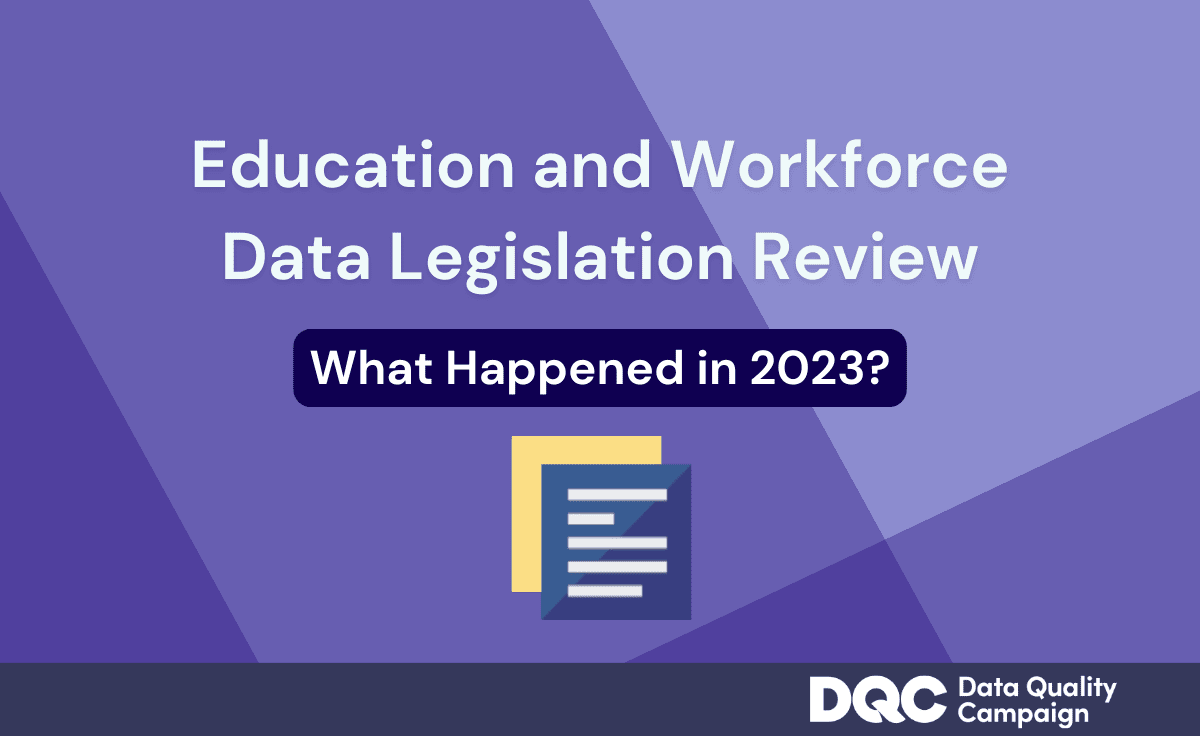The number of states with cross-sector, leadership-level data governance laws doubled this year
WASHINGTON (October 17, 2023) – Each year, state legislators craft new policies that drive data access and use across their states. As part of a comprehensive review of state education and workforce data legislation, the Data Quality Campaign (DQC) tracked 269 bills in 44 states and the District of Columbia—72 of which became law in 26 states and DC—that generate new data collections, analyses, and resources. Three of the most notable new laws address cross-agency data governance, which brings together leaders from agencies to share a table, make transparent decisions about data, and prioritize robust data access that works for individuals, the public, and policymakers.
DQC’s latest resource, Education and Workforce Data Legislation Review: What Happened in 2023?, highlights cross-agency data governance as the most important step that states must take to ensure people have access to the data they need to make education and workforce decisions. Information about people’s experiences in education and the workforce is stewarded by different state agencies that contribute to statewide longitudinal data systems (SLDSs), which connect data from early childhood through K–12 education, postsecondary education, and the workforce. Legislation that codifies governance across contributing state agencies is the most effective way to ensure that agencies come together for shared decisionmaking and that data governance efforts last across changes in state priorities and leadership.
“Legislators are uniquely positioned to bring together data across sectors in a sustainable way that makes data access possible,” said DQC President and CEO Jennifer Bell-Ellwanger. “In just one year, the number of states with cross-agency data governance codified in law doubled, which is a testament to a larger shift toward laws that lay the foundation to enable data access for individuals, the public, and policymakers alike.”
Alabama, Montana, and Rhode Island joined California, Kentucky, and Maryland in passing legislation that will bring cross-sector leaders to a shared table to make decisions about data. These new laws serve as data governance models for other states:
- A new Alabama law created a P–20W Council to govern the state’s data system, ensuring data security, establishing a research agenda, and approving research requests. This law also established the Office of Education and Workforce Statistics to manage the system on behalf of the Council, a best practice for ensuring that a neutral broker is responsible for implementing the data system and fulfilling its mission.
- Legislators in Montana created and funded the Education and Workforce Data Governing Board, which is charged with formulating policies to share and protect data among K–12, higher education, and workforce agencies while ensuring compliance with federal and state privacy laws.
- Rhode Island established the Rhode Island Longitudinal Data System Center to manage and operate the state’s data system, conduct research, and evaluate programs. The law further established the Rhode Island Longitudinal Data System Governing Board, which is responsible for overseeing, supervising, and directing the operational duties of the Center, as well as ensuring compliance with data privacy and security.
Codifying cross-agency data governance is not the only policy that legislatures pursued in 2023 to improve and expand state data access and use. Legislation also addressed:
- Funding SLDSs: Louisiana, Missouri, Montana, Rhode Island, and Washington, DC, funded their SLDSs through legislation. Missouri and Washington, DC, took an additional step to specifically provide funding to staff their data systems.
- Centering privacy: Seventeen states introduced 31 bills governing data privacy, and three of those states each passed a privacy law. Most bills focused on mandating safeguards for student data use by regulating third parties that provide education technology services.
- Ensuring greater access to data for decisionmaking: New laws in Texas and Virginia focused on supporting students’ academic journeys by providing families with information on their students’ K–12 performance or by providing students and families with information about what comes after high school.
“Next year, we hope to see a continued commitment to data access from lawmakers,” said Bell-Ellwanger. “Legislators must ensure SLDSs are sustainably funded and built to ensure that people have the education and workforce information they need to make decisions. DQC will continue to be a resource for state leaders as they take on this important work.”
View the full Education and Workforce Data Legislation Review: What Happened in 2023? report here.
###
The Data Quality Campaign is a nonprofit policy and advocacy organization leading the effort to ensure that data works for everyone navigating their education and workforce journeys. For more information, go to dataqualitycampaign.org.


